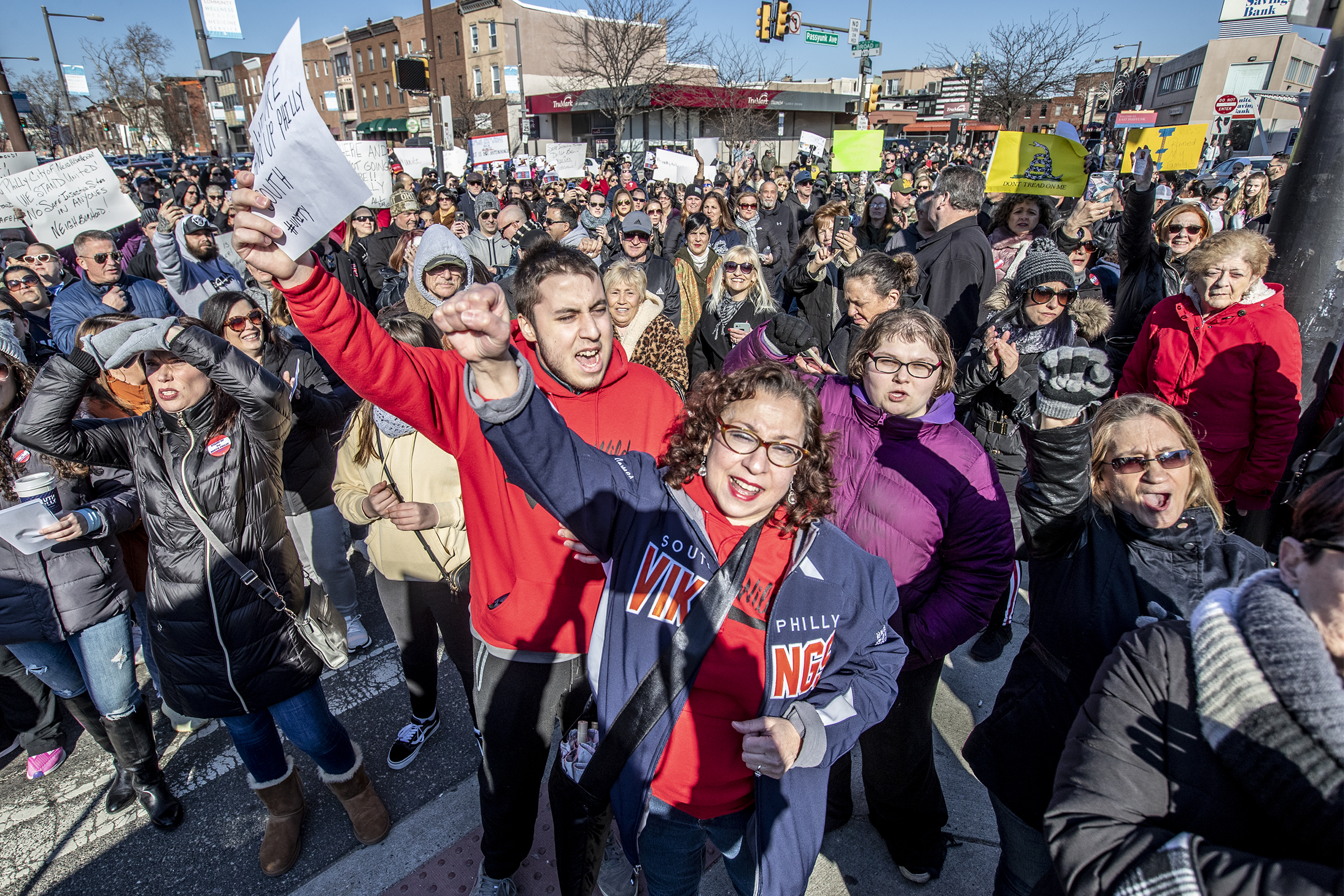Hundreds celebrate in South Philly, warn the city against supervised injection sites
Despite the reprieve, those who oppose the concept of providing a place for drug users to inject say they will not back down until the city drops all plans to support such sites.

Hundreds of South Philadelphia residents gathered Sunday afternoon to celebrate having stopped plans for a city-backed supervised drug injection site from opening in their community and to warn city officials not to try it again there or anywhere else in the city.
“They want to tax our soda and say soda is no good for you. But illegal heroin, that’s the answer!” Anthony Giordano shouted into a microphone. Giordano, the founder of Stand Up South Philadelphia and Take Back Our Streets, an anti-crime community group that started in January, was on a stage in front of the South Broad Street building where the supervised injection site was scheduled to open until the site’s nonprofit operator pulled the plug last week due to community backlash.
Giordano, joined by his wife and three children and other speakers in keeping the crowd of several hundred pumped up, said that despite the reprieve, those who oppose the concept of providing a place for drug users to shoot up will not back down until the city drops all plans to support such sites.
“I wanted to send a message to whoever thinks that they’re going to open up. This is what’s going to happen to them, also. We’re going to come out, we’re going to stand united, we’re going to have a positive, peaceful front,” said Giordano.
He encouraged those at the rally to make plans to be at a March 10 community meeting being held by Safehouse, the overdose prevention nonprofit that has city and court backing to open the site. The location of the meeting has not been announced, Giordano said.
Ronda Goldfein, Safehouse vice president, said Sunday: “Over the last few days, we’ve heard strong support and loud opposition to our public health approach to overdose prevention. This week, we will evaluate the best way to have productive conversations that focus on saving lives.”
Many at the rally said they did not see anything positive about the proposed supervised injection site, while they cited fears that the site would lead to more crime from more people in addiction and drug dealers in the community, and more people staying hooked on deadly drugs.
Advocates say supervised injection sites help prevent overdoses, by keeping people alive until they can go into recovery. They argue that similar sites in Canada and Europe have not attracted drug dealers or people in addiction to the area. Mayor Jim Kenney has said the site could save at least dozens of lives each year in Philadelphia, which has logged more than 3,000 fatal drug overdoses in three years.
Dennis Payne, 59, traveled from Kensington, ground zero in the city’s opioid crisis, to support those standing against the injection site, the Constitution Health Plaza. The former meth user and glue huffer, who only has one tooth left, said he had been clean and sober since the late 1980s.
“The people who took time to plan this site were only thinking of themselves and their own gain and not about the community,” he said. “Mayor Kenney, you know I’ve been trying to get you to clean up Kensington for a long time. ... You have sold out the youth of Philadelphia to black-market drug dealers.”
Tiffany Rittenhouse, 44, and her daughter Victoria, 9, hoisted signs denouncing the proposed site. “Giving a drug addict drugs is not going to help them. Giving them psychological help is what they need,” Rittenhouse said. “If they take that money and they open up a rehab that would be good, that would be helping these addicts.”
Lena Ruiz, 36, held a sign that said, “Fuhgeddaboudit Not In Our City.” Ruiz, who works for the city’s Department of Human Services, said “crime is rampant already. This will probably bring even more crime. They really need to think things out better, because they did this very sneakily.”
Most of the signs at the rally carried messages blasting the injection site, Kenney and former Gov. Ed Rendell, who backs the opening of the site. Frank Lo’Scalzo, 39, held an inflatable effigy of Kenney with real dollar bills stuffed in its waistband. “They’re not bringing drugs to our neighborhood. We’re good people here,” he said.
“If you want them not to die, get them off drugs. This is not the way to do that,” said Lo’Scalzo, who noted that his first cousin died from drugs last year and his wife’s father also died from addiction.
But Christopher Chabolcarminati, of Glenolden, held high a sign with dozens of names on both sides of friends and friends of friends who died of drug overdoses. Most died alone, he said, which is why he came to support the Safehouse site.
“I understand why these people are upset, but I also keep in mind that [the safe injection site] may save lives,” said Chabolcarminati, 35, a social worker and recovering heroin addict. “I support them standing up for their community, but I have to speak for those who do not have a voice.”
As the crowd moved from the rally site at Broad Street and Passyunk Avenue to Marconi Park, several blocks away, Rosemarie Bronico, 66, recalled that about 10 of her 38-year-old son’s friends died from opioid overdoses when they were in their 20s.
“I came out here to tell the city that we don’t want safe injection sites anywhere in Philadelphia. Helping kids shoot up on drugs is not helping anyone. Put that money into rehab, hire doctors that dedicate themselves to helping them,” she said. “Parents don’t want their kids to have a safe place to shoot up.”
Editor’s note: Ronda Goldfein of Safehouse is married to David Lee Preston, an editor at The Inquirer. He is not involved in coverage of this story.